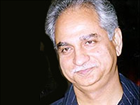


The Grand Hyatt’s Convention Centre’s lobby is milling with celebrities and all the camera-toting, microphone-waving, quote- byte hungry journos are out looking for their preys. I spot my quarry immediately - a man whom I have admired so long. Ramesh Sippy – the man who made Sholay (isn’t that enough for the intro?) - is just standing quietly in that maddeningly noisy crowd. His small frame doesn’t offer a clue to the great stature of the man in the world of Indian cinema. I request him for an interview and he generously obliges. Sitting on the high chairs near the lobby- mirror, I start asking him about his legendary directorial career and in measured soft sentences, he starts reminiscing. Here are the excerpts.
You started very young as a director. How did that journey begin?
I was lucky to be born into the film-making family of Sippys. Even as a kid I used to wander on the sets of my father’s (G.P.Sippy’s) films, trying to absorb whatever going on around me. We did not have formal training of film-making in those days. So I learnt about the techniques with practical hands-on approach and kept learning new things with each new film that I made.
What were the cinematic influences which shaped up your vision?
We then had some fabulous film-makers like K.Asif, Mehboob Khan, Raj Kapoor, Bimal Roy and Guru Dutt, all of whom influenced me. From Hollywood, David Lean’s films and great Westerns inspired me with their grand canvases. I always kept wondering why we can’t make films on a similar scale. I set myself high standards from the beginning. My very first film Andaz was considered ahead of its time. Then I made a comedy Seeta Aur Geeta and then came Sholay.
A family-drama like Andaz, a comedy like Seeta Aur Geeta, a dacoit-film like Sholay, a Bond- like caper Shaan, a father-son conflict Shakti and a love-triangle Saagar -as a filmmaker, you handled a different genre of film every time and managed to connect with classes as well as masses.
I must say I have tried to take on new challenges and try out new things. In Shaan, I had hired an art director from the Bond- movies to create the sets and special effects- especially the underwater scenes. Sometimes I have succeeded in my efforts and sometimes I haven’t. I wish as a producer, now I can inspire my team to have a similar vision of scaling new heights.
Sholay was like a great Western transplanted on Indian soil with a perfect Indian ethos. What went into its making?
The problem of banditry was very much there in Chambal Valley and Northern India. There were a few films like Ganga Jumna, Mother India and Mujhe Jeene Do made on the subject earlier. But our treatment was different- even the heroes were different. They were two lovable rogues. The screenplay, dialogues, casting, characterization- everything jelled well. The first thing I told my crew when we started making Sholay was ‘There will be no compromises. Let’s give it our best.”
I was lucky to have a great team with writers like Salim-Javed; a superb cast like Sanjeev Kumar, Dharmendra, Amitabh Bachchan and Amjad Khan and also some of the best technicians. Everybody contributed their best for this film. I might have been the captain of the ship but the ship doesn’t sail without the sails and the sailors!
The family- massacre sequence in Sholay is one of the most powerful scenes ever. How did you plan that shot?
That was a flashback sequence which explains Thakur Baldev Singh’s (Sanjeev Kumar) loss of arms and his quest for revenge. Coming on a vacation in a happy frame of mind and then finding almost everyone of his family killed by the escaped dacoit- Gabbar Singh (Amjad Singh)- it was one of pivotal moments in the film and it had to come across powerfully. I cannot really put it in words what goes into such a scene. It just happens!
You worked in many films with Pancham. What was that relationship like?
From Seeta Aur Geeta to Saagar, Pancham gave memorable music to five of my movies. He also always looked to do something new and that’s why we jelled well. Our relationship wasn’t just professional. We were friends who had some wonderful times together.
What is your reaction to the planned remake of Sholay by Ram Gopal Verma?
No comments!
What’s your take on remakes in general?
Well, everybody has a right to make a film according his vision. Remakes of classics like Devdas have done well in recent past. If the artistic and aesthetic senses are maintained, then I don’t see any harm in remaking any film.